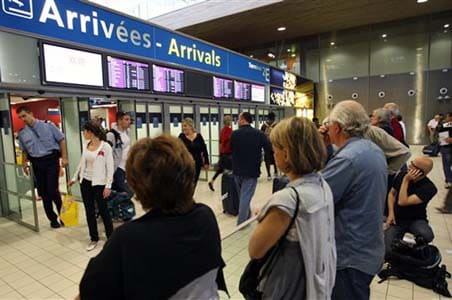
Brazilian military pilots potted an airplane seat, a life jacket, metallic debris and igns of fuel in the middle of the Atlantic Ocean on Tuesday as they hunted for a missing Air France passenger jet that carried 228 people. They found no signs of life.
The pilots spotted two areas of floating debris about 60 kilometres apart, about 650 kilometres beyond the Brazilian island of Fernando de Noronha, roughly along Flight 447's path from Rio de Janeiro to Paris, said Air Force spokesman Jorge Amaral.
"The locations where the objects were found are toward the right of the point where the last signal of the plane was emitted," Amaral said. "That suggests that it might have tried to make a turn, maybe to return to Fernando de Noronha, but that is just a hypothesis."
Amaral said authorities would not be able to confirm that the debris is from the plane until they can retrieve some of it from the ocean for identification.
Brazilian military ships are not expected to arrive at the area until Wednesday.
The discovery came more than 24 hours after the jet went missing, with all feared dead.
Rescuers were still scanning a vast sweep of ocean extending from far off northeastern Brazil to waters off West Africa. The 4-year-old plane was last heard from at 0214 GMT Monday (0744 IST). If no survivours are found, it would be the world's worst aviation disaster since 2001.
Investigators on both sides of the ocean are trying to determine what brought the Airbus A330 down, with few clues to go on so far. Potential causes could include violently shifting winds and hail from towering thunderheads, lightning or some combination of other factors.
The crew gave no verbal messages of distress before the crash, but the plane's system sent an automatic message just before it disappeared, reporting lost pressure and electrical failure. The plane's cockpit and "black box" recorders could be thousands of metres below the surface.
The chance of finding survivours now "is very very small, even nonexistent," said the French minister overseeing transportation, Jean-Louis Borloo. "The race against the clock has begun" to find the plane's two black boxes, which emit signals up to 30 days.
Borloo called the A330 "one of the most reliable planes in the world" and said lightning alone, even from a fierce tropical storm, probably couldn't have brought down the plane.
"There really had to be a succession of extraordinary events to be able to explain this situation,"
Borloo said on RTL radio on Tuesday.
French police were studying passenger lists and maintenance records, and preparing to take DNA from passengers' relatives to help identify any bodies.
France's Defence Minister Herve Morin said "we have no signs so far" of terrorism, but all hypotheses must be studied.
Alain Bouillard, who led the probe into the crash of the Concorde in July 2000, was put in charge of France's accident investigation team.
Track Latest News Live on NDTV.com and get news updates from India and around the world

